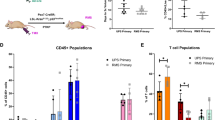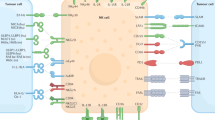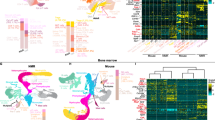Abstract
GERM LINE mutations affecting defined cell populations are often valuable tools in elucidating the function of these cells in complex biological systems such as tumour rejection. We report here that a mutant gene in the mouse called beige (bgJ), leads to a complete and selective impairment of naturally occurring killer lymphocytes, whereas all other forms of cell-mediated lysis are apparently normal. The defective gene product may lie within the lytic pathway subsequent to tumour cell contact. Because many cell types, including natural killer (NK) cells, T cells and macrophages, may be involved in tumour resistance in vivo1, these mice will provide a critical test of the hypothesis that it is NK cells which provide a first line of defence against neoplasia2. It is likely that this mutant will be invaluable for further investigations in tumour immunology just as the nude mouse has been indispensable in evaluating the role of thethymus in the development of the T-lymphoid system and the role of T cells in the rejection of tumours.
This is a preview of subscription content, access via your institution
Access options
Subscribe to this journal
Receive 51 print issues and online access
$199.00 per year
only $3.90 per issue
Buy this article
- Purchase on Springer Link
- Instant access to full article PDF
Prices may be subject to local taxes which are calculated during checkout
Similar content being viewed by others
References
Perlmann, P. & Cerottini, J. C. in The Antigens Vol. 5 (Academic, New York, in the press).
Kiessling, R. & Haller, O. in Contemporary Topics Immunobiol. 8, 171 (1978).
Lane, P. W. & Murphy, E. D. Genetics 72, 451 (1972).
Windhorst, D. B. & Padgett, G. J. invest. Derm. 60, 529–537 (1973).
Elin, R. J., Edelin, J. B. & Wolff, S. M. Infect. Immun. 10, 88–91 (1974).
Dent, P. B., Fish, L. A., White, J. F. & Good, R. A. Lab. Invest. 15, 1634 (1966).
Gidlund, M., Örn, A., Wigzell, H., Senik, A. & Gresser, I. Nature 273, 759–761 (1978).
Bevan, M. J. & Cohn, M. J. Immun. 114, 559–565 (1975).
Meerpohl, H. G., Loghmann-Matthes, M. L. & Fisher, H. Eur. J. Immun. 6, 213–217 (1976).
Currie, G. A. Nature 273, 758–759 (1978).
Kiessling, R. et al. J. exp. Med. 143, 772–780 (1976).
Ojo, E. & Wigzell, H. Scand. J. Immun. 7, 297–306 (1978).
Nelson, D. L., Bundy, B. M., Pitchon, H. E. & Blaese, R. M. J. Immun. 117, 1472 (1976).
Roder, J. C. & Kiessling, R. Scand. J. Immun. 8, 135–144 (1978).
Roder, J. C., Kiessling, R., Biberfeld, P. & Andersson, B. J. Immun. 121 2509.
Roder, J. C., Roson, A., Fenyö, E. M. & Troy, F. A. Proc. natn. Acad. Sci. U.S.A. (in the press).
Author information
Authors and Affiliations
Rights and permissions
About this article
Cite this article
RODER, J., DUWE, A. The beige mutation in the mouse selectively impairs natural killer cell function. Nature 278, 451–453 (1979). https://doi.org/10.1038/278451a0
Received:
Accepted:
Issue Date:
DOI: https://doi.org/10.1038/278451a0
Comments
By submitting a comment you agree to abide by our Terms and Community Guidelines. If you find something abusive or that does not comply with our terms or guidelines please flag it as inappropriate.



